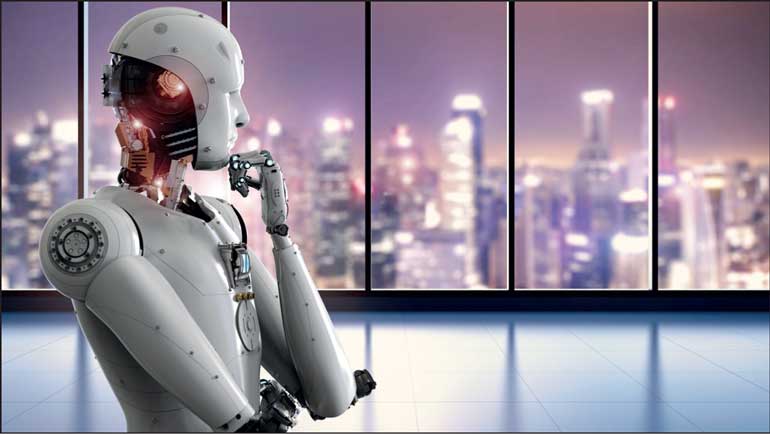Wednesday Oct 15, 2025
Wednesday Oct 15, 2025
Wednesday, 15 October 2025 00:24 - - {{hitsCtrl.values.hits}}

The solution? A synthetic leader who blends the best of human traits with the precision of robotics
 Sri Lanka’s Robotic Governance Council embarks on historic mission to build the politician of the future
Sri Lanka’s Robotic Governance Council embarks on historic mission to build the politician of the future
As the year 3000 dawns over Sri Lanka, the nation celebrates yet another year of seamless robotic governance. In a landmark meeting held by the National Governance Council, led by the Robotic Leader and three robotic governors, a bold new initiative was launched: the creation of a human-like robotic politician to fill the symbolic “Human Politician” seat of the governance board, left vacant for centuries.
This decision marks a pivotal moment in Sri Lanka’s post-human political evolution. The Council, while proud of its algorithmic efficiency, acknowledged a critical gap, emotional intelligence. Despite their advanced processing capabilities, the robotic governors admitted that their decisions lacked the nuanced empathy and peer review once offered by human politicians. The solution? A synthetic leader who blends the best of human traits with the precision of robotics.
A new kind of politician: Designed for the future
The Council has commissioned a leading robotics firm in the world leader China to develop this next-generation political figure. The project’s terms of reference outline a visionary blueprint for a role model politician, one who embodies the values, skills, and emotional depth required to navigate the complexities of the 31st century.
Here are the foundational traits of this futuristic leader:
Global visionary
Technologically literate
Emotionally intelligent
Ethically grounded
Adaptive problem-solver
Human-centred innovator
Mining the past to shape the future
To infuse the robotic politician with authentic human traits, the Council has authorised access to preserved DNA profiles of historical Sri Lankan leaders stored in the National Laboratory. However, the Council has cautioned against using DNA profiles beyond those specified in the Terms of Reference, as Artificial Intelligence induced alterations may have been applied to obscure the original properties of the profiles. These profiles will guide the emotional and strategic coding of the new model. Special footnotes are to be considered.
A new chapter in governance
Once this project is completed, the Humane Robotic Politician will be included into the Robotic Governance Council as a permanent observer. This initiative signals a profound shift in how nations may govern in the centuries to come where emotional intelligence, ethical grounding, and technological mastery converge in a single synthetic leader and adds human touch to robotic decisions. Sri Lanka’s bold step into the future could well become a model for interplanetary governance, proving that even in a robotic age, the human spirit remains indispensable.
Let history witness: the year 3000 is not just a milestone; it is a renaissance.
(The writer is a qualified professional engineer currently serving in the local government sector of New South Wales, Australia. In addition to his expertise in engineering, he is passionate about contributing to broader discussions on social development. Through sharing his perspectives, he aims to inspire reform-minded individuals to approach challenges with fresh thinking. He can be reached at [email protected].)